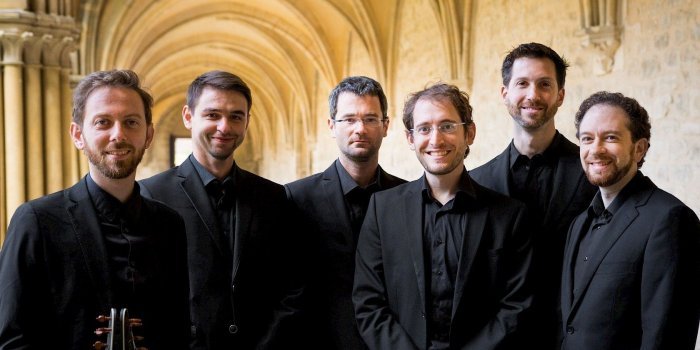
Early Music Vancouver recently pulled out all the stops at Christ Church Cathedral, not on its impressive organ, but with Stars of the Italian Renaissance: Monteverdi & Rossi featuring the five mellifluous voices of Profeti della Quinta, directed by the quintet’s founder, Elam Rotem.
COVID put a stop to two previous dates with this outstanding consort, comprised of bass (Rotem), two tenors and two countertenors, with Ori Harmelin on theorbo, a glorious instrument that looks similar to a lute with a neck that extends almost two metres; so their appearance this year was received with trebled enthusiasm.
The programme amalgamated the works of two musical colleagues who composed and performed at the Gonzaga court in Mantua, Italy, at the beginning of the 17th century. Renowned Claudio Monteverdi teamed up with a much less famous Salomone Rossi, a Jew who played in the court as his day job and revolutionized the music of the synagogue in his spare time.
The first part of the programme featured Rossi’s music to Psalms from the Torah, their texts sung in Hebrew accompanied in the programme notes by English translations that enlightened and enhanced the musical experience. After the performance, Rotem mentioned that Profeti della Quinta’s expressive interpretation of the music is due to their focus on text, meaning, and emotional content. That showed.
Two beautifully segued madrigals by Luzzascho Luzzaschi acted as a bridge between Rossi’s sacred Jewish music and Monteverdi’s more dramatic opera excerpts, Lamento della ninfa (The Nymph’s Lament) with libretto by Ottavio Rinuccini and Lamento d’Arianna (Arianna’s Lament), the text also written by Rinuccini. This second Monteverdi lament is practically all that has survived the opera, Arianna. Both pieces were executed with impassioned sensitivity and vocal versatility by lead countertenor Doron Schleifer.
For much of the early part of the programme, Schleifer was accompanied solely by the other four voices, while the theorbo featured in instrumentals and augmented the accompaniment only occasionally. However, the theorbo came into its own later, and the blend of the singers’ clean harmonies, enriched by Harmelin’s fingers skipping delicately over his unique instrument’s frets, was thrilling. The acoustics in the cathedral meant the voices needed no electronic enhancement, and their crisp, crystal harmonies blended with Schleifer’s liquid notes to perfection.
It all ended with a beautiful madrigal, Zefiro torna e’l bel tempo rimena, that begged an encore. It was delivered in the form of Rossi’s closing Jewish prayer, roughly translated as “He makes peace in heaven, who makes peace on earth.”
“This is our mission,” said Rotem in his introduction and the Amen at the end of that prayer, though left unspoken by the audience, was felt. Indeed, the entire evening was heavenly.